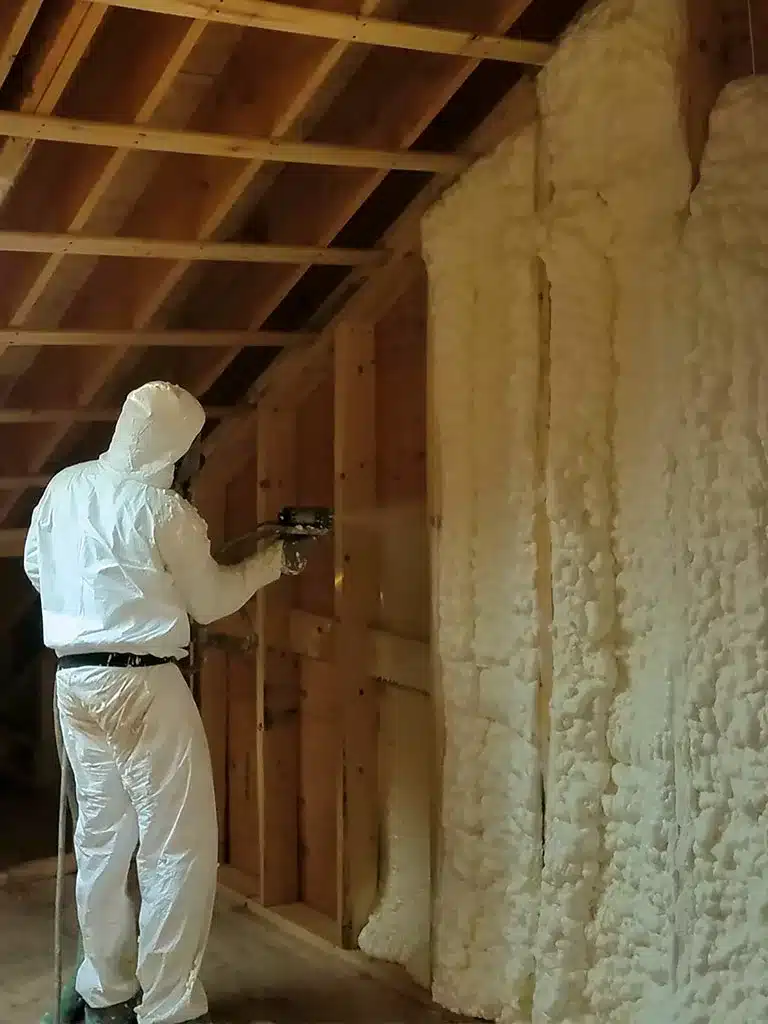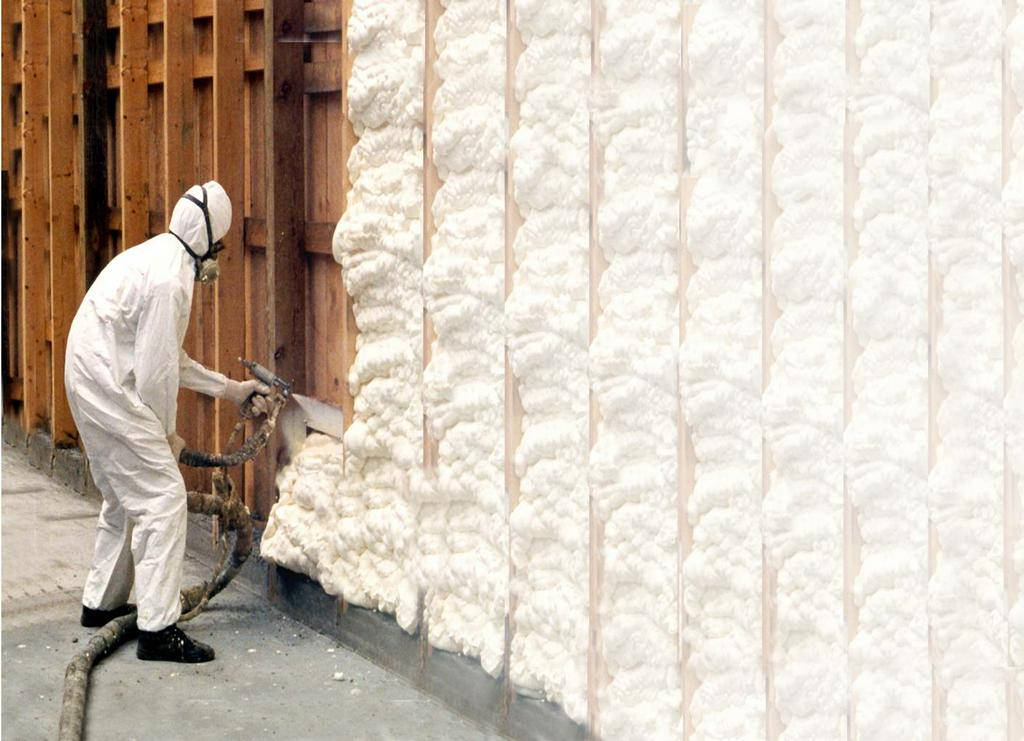Comparing Spray Foam to Standard Insulation: Which Is Better?
Comparing Spray Foam to Standard Insulation: Which Is Better?
Blog Article
Spray Foam: The Ultimate Solution for Air Sealing and Insulation
Spray foam insulation has actually arised as a leading service for efficient air securing and thermal insulation, offering a special mix of residential properties that set it aside from standard approaches. Its ability to increase and load gaps makes it especially efficient in protecting against air leak, which can considerably affect power efficiency. Recognizing the complete scope of its benefits, installation processes, and contrasts with various other insulation kinds is vital for making educated decisions. As we check out these elements, the effects for both brand-new building and constructions and retrofits become increasingly considerable. What aspects should affect your selection?
What Is Spray Foam?
Spray foam is a functional insulation product that incorporates the principles of air sealing and thermal resistance to boost energy efficiency in buildings. Made up mainly of polyurethane or other comparable compounds, spray foam is applied as a fluid that broadens upon contact with surface areas, producing a solid, continual layer of insulation. This distinct residential or commercial property permits it to fill voids, fractures, and voids that typical insulation products may ignore, offering a superior air seal.
There are 2 main kinds of spray foam: open-cell and closed-cell. Open-cell spray foam is lighter and a lot more flexible, using outstanding audio absorption and a lower R-value per inch - Spray Foam. In comparison, closed-cell spray foam is denser, offering a greater R-value, moisture resistance, and included structural stability to building elements
The application procedure normally involves specific tools, guaranteeing a smooth application that abides by different substratums, including wood, concrete, and steel. This flexibility makes spray foam suitable for both new building and constructions and retrofitting existing structures. Its capability to develop a closed obstacle considerably adds to reducing energy intake and improving interior air quality, therefore making it a preferred option amongst home builders and homeowners alike.
Advantages of Spray Foam Insulation
Among the most substantial advantages of spray foam insulation is its phenomenal ability to create a continual air barrier, which efficiently lessens power loss. Unlike traditional insulation materials, spray foam broadens to load gaps and cracks, making certain that air leak is significantly decreased. This particular not just boosts energy efficiency however likewise results in lower utility bills with time.
In addition, spray foam insulation gives premium thermal resistance, adding to a much more steady indoor environment. Its high R-value per inch allows for reliable insulation in constrained areas, making it optimal for attics, walls, and crawl rooms. In addition, the moisture-resistant homes of spray foam help prevent mold and mildew and mold development, promoting much healthier living problems.
An additional important benefit of spray foam insulation is its sound-dampening qualities (Spray Foam). It properly lowers noise transmission between areas, producing a quieter and more comfy home atmosphere. The toughness of spray foam likewise stands out, as it does not droop or clear up gradually, maintaining its efficiency throughout its life expectancy
How Spray Foam Functions
Recognizing how spray foam insulation functions is necessary for valuing its effectiveness in air securing and thermal resistance. Spray foam insulation includes 2 primary parts: isocyanate and polyol resin. When these parts are blended, they undergo a chemical reaction that creates the material to expand swiftly, producing a thick foam that fills fractures, cavities, and spaces.
As the foam broadens, it sticks to surface areas, creating an airtight seal that substantially reduces air seepage. This particular makes spray foam insulation highly effective at stopping drafts and moisture infiltration, which can lead to energy loss and damages gradually. In addition, the closed-cell version of spray foam offers exceptional thermal resistance because of its inflexible structure, properly decreasing warmth transfer.
The unique buildings of spray foam allow it to comply with irregular surfaces, making certain detailed insurance coverage and a seamless barrier. As an outcome, spray foam insulation not just enhances power effectiveness however likewise adds to improved indoor air high quality by reducing the build-up of allergens and pollutants. Eventually, comprehending the auto mechanics behind spray foam underscores its function as an exceptional selection for insulation and air securing in both property and business applications.
Installation Process Introduction

Prior to setup, the area has to be appropriately cleaned up and prepped, making sure that surface areas are devoid of particles, dust, and moisture. This action is crucial because pollutants can compromise bond and overall performance. When the area is prepared, the application entails mixing both click here for info elements of the spray foam, which increases upon call and fills voids successfully.
Educated specialists need to carry out the setup, utilizing customized equipment to make you could check here sure consistent protection and optimum density. Security safety measures, consisting of wearing protective gear and making sure correct ventilation, are crucial during this process. After application, the foam typically cures rapidly, creating a strong obstacle that boosts energy effectiveness.
Contrasting Spray Foam to Typical Insulation
When reviewing insulation alternatives, spray foam insulation stands out in comparison to traditional products such as fiberglass and cellulose. Unlike fiberglass and cellulose, which can enable air seepage, spray foam expands upon application, loading voids and crevices to produce an airtight seal.
In addition, spray foam offers a greater R-value per inch than standard insulation kinds, supplying more reliable thermal resistance in a thinner profile. This characteristic is especially helpful precede with restricted dental caries deepness. Spray foam is immune to wetness and mold and mildew growth, which can be a significant concern with cellulose and fiberglass, specifically in humid atmospheres.
Nevertheless, spray foam insulation generally carries a greater ahead of time price than its typical equivalents. House owners should evaluate this initial investment against lasting energy financial savings and performance benefits. Inevitably, while both insulation types serve their objective, spray foam becomes a much more advanced service for contemporary insulation demands, specifically in regards to air sealing and thermal performance.

Final Thought
In summary, spray foam insulation represents a highly efficient solution for accomplishing optimum air sealing and thermal resistance. Its special residential or commercial properties, including dampness resistance and sound dampening, make it suitable for different applications in both brand-new building and constructions and retrofitting projects (Spray Foam). Although imp source the preliminary expenses might be higher compared to standard insulation products, the long-lasting advantages, such as considerable energy financial savings and improved interior air top quality, justify the investment and underscore its worth in modern building techniques.
Spray foam insulation has actually emerged as a leading remedy for effective air sealing and thermal insulation, offering a distinct mix of buildings that establish it apart from conventional approaches.Spray foam is a functional insulation product that incorporates the concepts of air securing and thermal resistance to enhance power efficiency in buildings.When reviewing insulation choices, spray foam insulation stands out in comparison to conventional materials such as fiberglass and cellulose. Eventually, while both insulation kinds offer their function, spray foam arises as a much more innovative option for modern insulation requirements, particularly in terms of air sealing and thermal performance.
In recap, spray foam insulation represents a highly effective service for accomplishing optimal air securing and thermal resistance.
Report this page